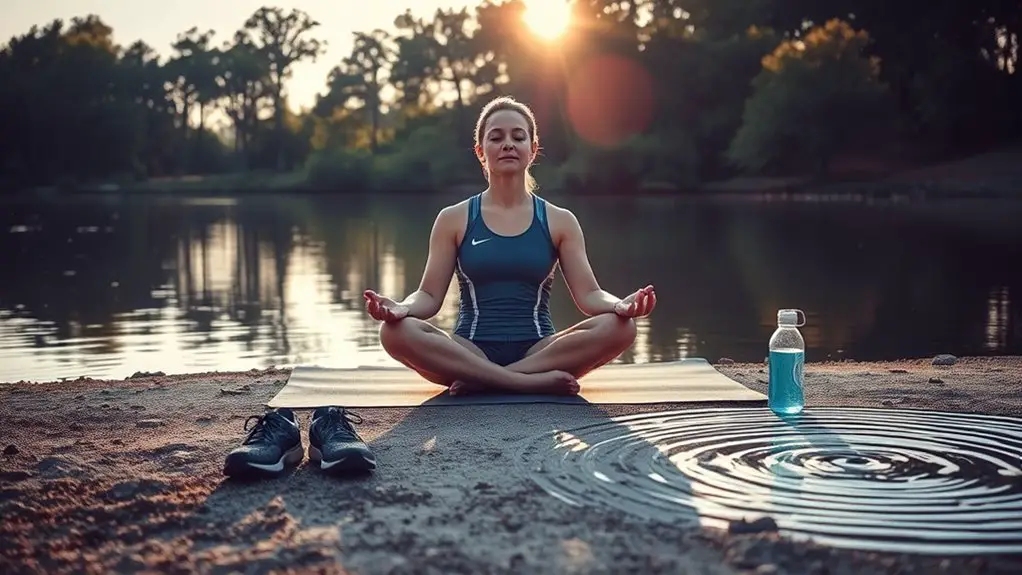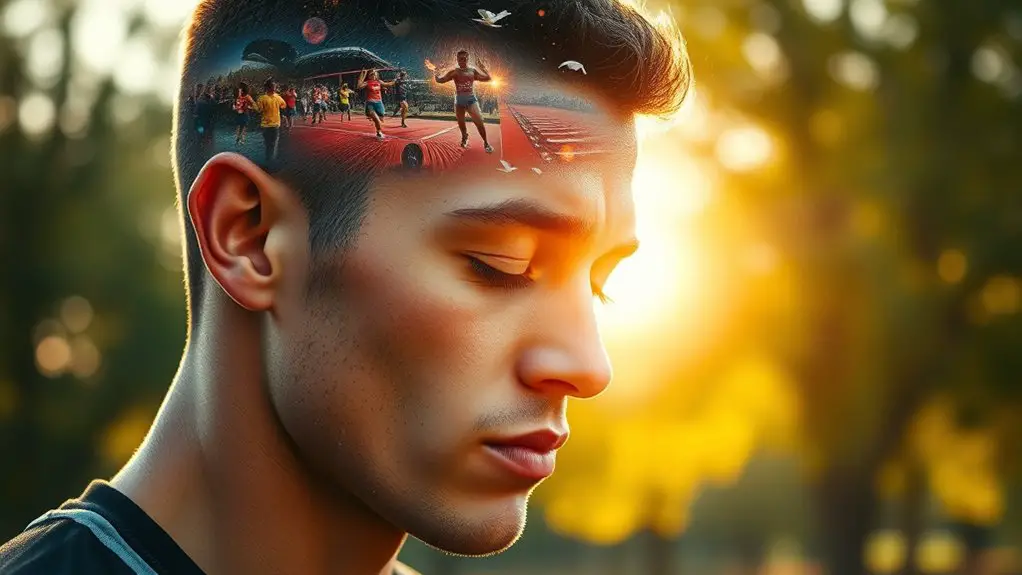Social media affects your mindset by connecting you with fans and fellow athletes, which can inspire and motivate you. However, it also exposes you to online criticism and unrealistic comparisons that might hurt your self-esteem. Balancing the positives and negatives is key. You can cultivate your personal brand while steering through challenges. If you want to explore effective strategies for managing social media's impact, there's plenty more to uncover about this dynamic landscape.
The Positive Aspects of Social Media for Athletes
While some may worry about the effects of social media on athletes, it actually offers numerous positive aspects that can enhance their careers and personal growth. For one, social media allows you to connect with fans and fellow athletes, creating a sense of community that can bolster your motivation. Sharing your journey can inspire others, giving you a sense of purpose beyond the sports field.
Additionally, you can access training tips, health advice, and mental wellness resources from a wide array of experts. This wealth of information can empower you to make informed decisions about your body and mindset. Moreover, social media helps you stay up-to-date with the latest trends in your sport, ensuring you remain competitive. By embracing these platforms, you can cultivate resilience and adaptability, essential traits for any athlete. Ultimately, social media can be a powerful tool for growth and success in your athletic journey. Furthermore, mindfulness meditation can enhance focus and reduce anxiety, leading to improved performance and mental well-being.
Building a Personal Brand Through Social Media
Building a personal brand on social media starts with defining your unique voice. It's not just about posting; you need to engage with your followers effectively and showcase your authenticity and passion. By doing this, you create a genuine connection that sets you apart in the crowded digital space.
Defining Your Unique Voice
How can you effectively carve out your unique voice in the crowded world of social media? Start by embracing what makes you, you. Authenticity is key; don't try to fit into someone else's mold. Share your journey, values, and passions—this resonates with others and builds a genuine connection. Use your platform to express thoughts that reflect your beliefs, whether it's about sports, life, or personal growth. Consistency is essential, so stay true to your message while also being open to evolution. Engage in meaningful conversations, and don't shy away from vulnerability; it shows your human side. By defining your unique voice, you'll attract followers who appreciate your authenticity and want to join you on your journey to freedom.
Engaging With Followers Effectively
Engaging with your followers effectively is essential for developing a strong personal brand on social media. Building genuine connections can empower you and enhance your influence. Here are three ways to engage with your audience:
- Respond to Comments: Show appreciation for their support by replying to comments. It makes followers feel valued and fosters community.
- Share Insights: Offer tips or behind-the-scenes content related to your athletic journey. This not only showcases your expertise but also invites meaningful conversations.
- Host Q&A Sessions: Encourage followers to ask questions about your training, mindset, or experiences. This interaction deepens your relationship and allows fans to connect with you on a personal level.
Showcasing Authenticity and Passion
Authenticity and passion are at the heart of a compelling personal brand on social media. When you share your true self and your love for the sport, you connect with others in a meaningful way. It's about showcasing what drives you, your struggles, and triumphs. This creates a genuine bond with your audience.
Here's a quick overview of how to showcase authenticity and passion:
| Strategy | Impact |
|---|---|
| Share personal stories | Builds trust and relatability |
| Post behind-the-scenes content | Offers a glimpse into your life |
| Engage in causes you care about | Connects with like-minded fans |
| Use your unique voice | Stands out in a crowded space |
| Celebrate small victories | Inspires others on their journey |
Embrace your journey, and let your passion shine!
The Impact of Online Criticism and Trolls
Although social media can serve as a powerful platform for athletes to connect with fans and showcase their skills, it also exposes them to a barrage of online criticism and trolling. This negativity can affect an athlete's mindset considerably, leaving them vulnerable to doubts and insecurities.
Social media can empower athletes but also subjects them to relentless criticism that undermines their confidence and mindset.
Here are three key impacts of online criticism:
- Mental Strain: Constant negativity can weigh heavily on your mental health, leading to anxiety or depression.
- Focus Disruption: Worrying about what others say may distract you from your training and performance goals, hindering your growth.
- Self-Perception Issues: Repeated trolling can distort how you view yourself, making it hard to maintain confidence in your abilities.
Navigating this toxic environment is tough, but remember: your value isn't defined by online opinions. Embrace the freedom to shape your own narrative and rise above the noise.
Unrealistic Comparisons and Their Effects on Self-Esteem
As you scroll through social media, it's easy to fall into the trap of comparing yourself to other athletes, especially those who seem to have flawless lives and careers. You might find yourself questioning your own talent, achievements, and even your worth. Those perfectly curated posts can create an illusion, making you feel like you're not doing enough, or worse, that you don't measure up at all.
These unrealistic comparisons can deeply affect your self-esteem. Instead of celebrating your unique journey, you might focus on perceived shortcomings. Remember, those highlights don't capture the struggles, failures, or hard work behind the scenes. Everyone's path is different, and your value isn't defined by likes or followers. Embracing your challenges can help you develop mental toughness, allowing you to navigate these feelings with resilience.
Embrace your own journey, set personal goals, and recognize your achievements. By shifting your focus from comparison to self-acceptance, you'll cultivate a healthier mindset that allows you to thrive both on and off the field.
Social Media and Mental Health: A Double-Edged Sword
Scrolling through curated feeds can amplify feelings of inadequacy, but social media's impact on mental health goes beyond just comparisons. It's a double-edged sword, offering both support and stress. On one hand, you can connect with like-minded athletes, but on the other, you might find yourself overwhelmed by the pressure to perform.
Social media can foster connection among athletes, yet it also breeds pressure and self-doubt, creating a complex mental health landscape.
Here are three ways social media affects your mental health:
- Community Building: Engaging with fellow athletes can create a sense of belonging and support, especially during tough times.
- Pressure to Conform: The constant stream of idealized images can lead to anxiety and self-doubt as you feel the need to measure up.
- Information Overload: With endless advice and opinions, it's easy to feel lost or confused about your own training and mental strategies. Moreover, intrinsic motivation can be hindered when external comparisons dominate your mindset.
Finding balance is essential to harness the benefits while mitigating the downsides.
Strategies for Managing Social Media Influence
To effectively manage the influence of social media, it's crucial to establish boundaries that protect your mental well-being. Start by limiting your time online and curating your feed. Surround yourself with positivity and support. Here are some strategies to reflect on:
| Strategy | Benefit |
|---|---|
| Set Time Limits | Reduces overwhelm |
| Curate Your Feed | Fosters a positive environment |
| Mute Negative Accounts | Shields your mindset |
The Future of Social Media in Sports and Athlete Mindsets
As social media platforms continue to evolve, you'll notice their impact on how athletes communicate and engage with fans. Mental health awareness is becoming more prominent, shaping how athletes perceive their own well-being in the public eye. Additionally, performance measurement trends are increasingly influenced by social media, affecting how athletes approach training and competition.
Evolving Communication Platforms
While social media has transformed how athletes communicate with fans and each other, the future promises even more dynamic platforms that could redefine these interactions. You'll likely see innovations that enhance connection, allowing athletes to share their journeys more authentically. Here are three evolving communication platforms to watch:
- Virtual Reality (VR): Imagine experiencing a game from an athlete's perspective, making fans feel like they're part of the action.
- Augmented Reality (AR): This could bring stats and highlights to life, engaging fans in immersive ways.
- Decentralized Networks: These platforms might empower athletes to control their narratives and monetization, fostering a more direct bond with their audience.
Embracing these changes can lead to richer experiences for both athletes and fans.
Mental Health Awareness
With the rise of social media, mental health awareness among athletes has become more prominent, reflecting an essential shift in how sports culture addresses well-being. You're likely noticing more athletes openly discussing their struggles and advocating for mental health resources. This openness fosters a supportive environment, encouraging you and your peers to prioritize mental wellness. As you scroll through feeds filled with genuine conversations, it's clear that vulnerability is becoming a strength, not a weakness. You're part of a movement that challenges stigma and promotes self-care. By embracing this shift, you empower not just yourself but also future athletes to seek help, share experiences, and ultimately thrive in both sport and life. The future of sports is about balance, authenticity, and mental wellness.
Performance Measurement Trends
The growing emphasis on mental health in sports has opened up new avenues for performance measurement, particularly through social media. Athletes can now leverage these platforms to gain insights into their mindset, track their progress, and connect with fans. Here are three performance measurement trends you should watch for:
- Real-Time Feedback: Athletes can receive instant reactions to their performances, helping them adjust their mental game on the fly.
- Community Support: Engaging with fans and fellow athletes fosters a sense of belonging, which can enhance motivation and resilience.
- Data Analytics: Social media metrics can provide valuable data on audience engagement, allowing athletes to refine their personal brand and mental approach.
Embrace these trends to elevate your performance and mindset!
Frequently Asked Questions
How Can Social Media Improve Team Dynamics Among Athletes?
Imagine a basketball team using a private group chat. You can share strategies, celebrate wins, and support each other during tough times. This fosters unity, strengthens bonds, and enhances communication, ultimately boosting team dynamics and performance.
What Role Do Coaches Play in Athletes' Social Media Usage?
Coaches play a crucial role in guiding your social media use. They can help you understand its impact, encourage positive interactions, and set boundaries, allowing you to focus on your performance while building a supportive online community.
How Does Social Media Affect Athletes' Performance on the Field?
Social media can distract you during games, pulling your focus away from the field. It might lead to pressure to perform or seek validation, which can ultimately impact your confidence and overall performance when it counts.
Are There Age-Related Differences in How Athletes Use Social Media?
When it comes to age-related differences in social media use, you'll find younger athletes often embrace it like a second skin, while older ones might tread more cautiously, balancing privacy with public persona.
What Privacy Concerns Do Athletes Face on Social Media Platforms?
You're likely aware athletes face serious privacy concerns on social media. They must protect personal information, manage unwanted attention, and navigate potential threats to their safety while balancing public personas with their private lives.




